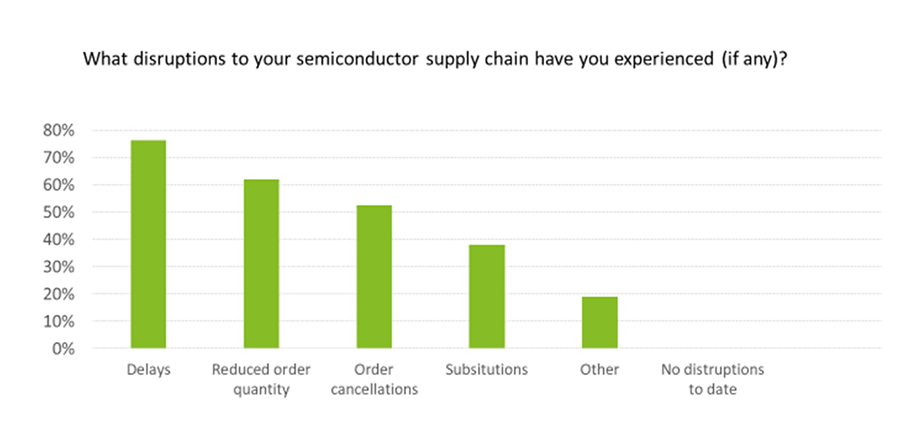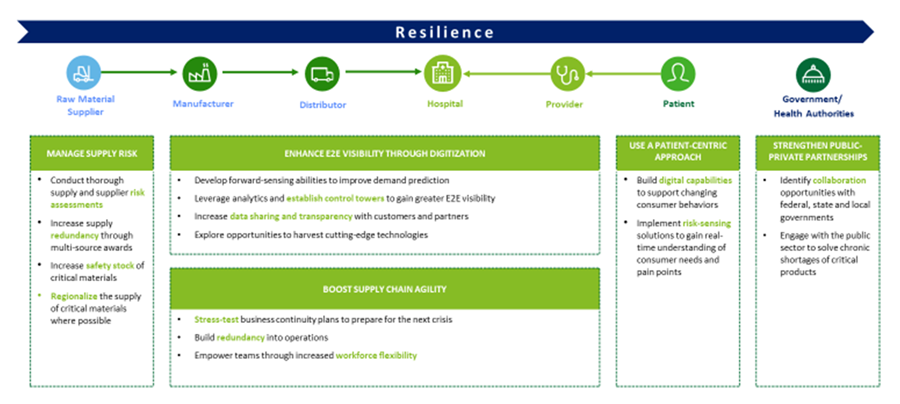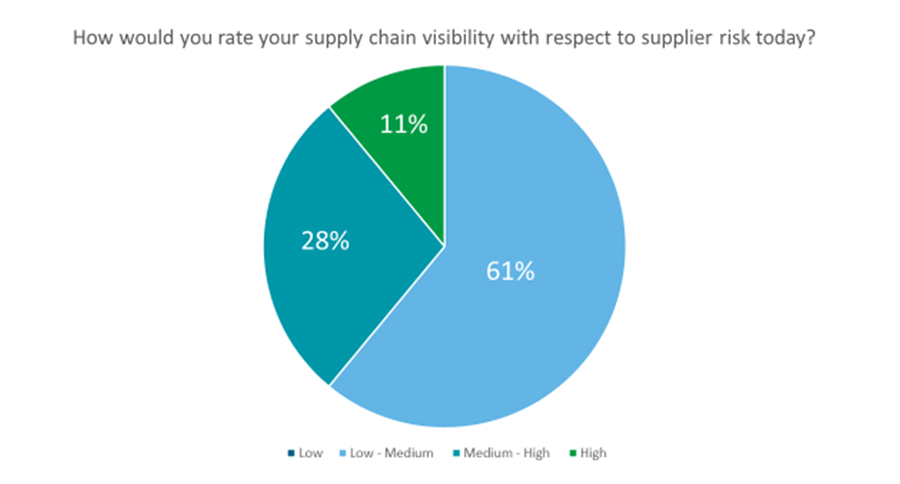The Semiconductor Chip Shortage Hits Medtech: Strategies to Build Resilient Supply Chains

The global semiconductor chip shortage is becoming an acute issue for Medtech companies. However, developing strategies to bolster supply chain resilience can help companies mitigate current and long-term risks.
Hypergrowth in semiconductor chip demand is a reality—the global market is projected to grow from $452.2 billion in 2021 to $803.1 billion in 2028—coupled with pandemic- and weather-related supply chain disruptions are causing critical chip shortages in numerous industries, including medical technology (Medtech). The Medtech chip shortage places at potential risk millions of patients across the United States who depend on chip-powered equipment and devices including ventilators and defibrillators; imaging machines; glucose, ECG, EEG, and blood pressure monitors; implantable pacemakers; and more.
Most government, media, and boardroom attention to date has focused on addressing chip shortages in the high-profile, economy-driving consumer electronics and automotive industries. There is a strong case, however, for including Medtech on the list of high-priority industries, to safeguard those patients who rely on medical technologies for lifesaving and life enhancing care. However, Medtech companies cannot rely solely on external sources for relief; they should develop strategies to build resilient supply chains to manage and mitigate both current and long-term risks.
Chip Shortage Issue is Industry-wide
The chip shortage isn’t affecting just one Medtech device or a single organization; it’s becoming an acute, industry-wide issue for the hundreds of diagnostics, therapeutics, and capital equipment companies that produce essential medical technologies. Total medical semiconductor revenue in 2019 was $5.1 billion — about one percent of the $415 billion total semiconductor market.
Deloitte combined insights from a survey and interviews with members of the leading Medtech association AdvaMed to determine the extent of the Medtech industry’s semiconductor use and how the shortage is impacting company supply chains. Among important findings:
- Two-thirds of companies have semiconductors and firmware/embedded software in over half of their products. In addition, 50 percent of respondents report that connected devices, which also require semiconductors, comprise half of their product portfolio.
- Medtech’s primary needs are 2nd or 3rd generation chips, placing it in competition with automotive, industrial, and consumer industries for critical chips rather than high tech.
- All respondents have experienced some disruption to their chip supply chain (figure 1). The most common disruptions are delays, order cancellations and short orders. Delays vary significantly, from two to 52+ weeks. According to one Medtech procurement lead, “Initially we were told we need to issue purchase orders until 2023 but that doesn’t seem to be enough to secure supply anymore.”
Figure 1. Percentage of Respondents Who Have Experienced Some Disruption to Their Chip Supply Chain

Copyright © 2021 Deloitte Development LLC. All rights reserved.
Strategies to Build Resilient Supply Chains
The semiconductor shortage is the latest supply chain challenge to hit the Medtech industry, and it is unlikely to be the last. Every company, therefore, should develop vendor engagement and management strategies to mitigate risk and enhance resilience to existing and potential supply chain disruptions (figure 2). Suggested strategies include:
Figure 2. Strategies to Increase Resilience to Supply Chain Disruptions

Sources: Deloitte analysis. Copyright © 2021 Deloitte Development LLC. All rights reserved.
1. Manage Supply Risk.
Sourcing strategy can have important implications for supply chain resilience. Over 70 percent of survey respondents indicate more than half of their semiconductors are single source. While having one trusted supplier can lead to cost savings with higher volume spend, a single supplier lacks redundancy during a disruption. According to one interviewed Medtech procurement lead, “We are trying to identify alternative sources but qualifying new materials is time consuming and expensive. Even for a $0.30 part, it could take a year to approve the new material.” Providing working capital (e.g., upfront payments) may incentivize suppliers to prioritize their Medtech customers.
Holding raw materials inventory to buffer variations in supply is another way to manage supply chain risk. Echoing historic behavior during earlier chip shortages, companies in certain industries over-purchased and built up their chip inventories in the first half of 2021 because of pandemic-induced supply chain disruptions. Medtech companies can mitigate the impact of potential supply disruptions by proactively managing supply risks, by conducting supply and supplier risk assessments, increasing supply redundancy and developing regional supply sources where practical.
2. Enhance End-to-End (E2E) Visibility Through Digitization.
Over 60 percent of respondents rate visibility into supplier risk as low to medium (figure 3). Medtech companies often source device components (assembly, sub-assembly) from multiple vendors with whom they may not have direct contact. Better visibility into demand increases from other industries could help reduce risk of supplier shortages or delays. Advanced web scraping tools are being used to deliver market-wide visibility to component and commodity risks. Similarly, a supply network management solution can provide supply chain visibility, issue and risk identification, prescriptive risk management, and continuous monitoring.
Figure 3. Over 60% of Respondents Rate Visibility Into Supplier Risk as Low to Medium

Copyright © 2021 Deloitte Development LLC. All rights reserved.
3. Boost Supply Chain Agility.
Build redundancy into supply chain operations and stress-test business continuity plans to prepare for the next crisis (because there will be one). Proactive organizations critically evaluate their supply risks and build redundancy into operations where feasible, prioritize critical products, develop inventory strategies and pressure test their systems to understand their ability to respond.
4. Use a Patient-centric Approach.
Build digital capabilities to support changing consumer behaviors. Implement risk-sensing solutions to gain real-time understanding of consumer needs and pain points. These patient or consumer-centric capabilities provide insights that help organizations improve customer service, delivery, quality and more quickly identify changes in the market and more efficiently and effectively respond.
5. Strengthen Public-private Partnerships.
Suppliers often have a choice in allocating limited supply. Work with industry associations to heighten government awareness of the importance of medtech devices to public health, especially during tight allocation for critical materials. Identify collaboration opportunities with federal, state, and local governments to solve chronic product shortages.
Good News on the Horizon?
While supply remains tight and lead times have stretched to 52 weeks for some semiconductors, supply conditions for buyers should improve later this year and in 2022-2023. Right now, many companies in various industries—medtech included—are over-ordering and building inventory to avoid being caught unprepared again; once supplies reach certain levels, demand levels should decline and lead times for some chips shrink. Also, major chipmakers have been investing heavily in new equipment and upgrading/building facilities to boost production capacity. Despite these encouraging signs, medtech company leaders should continue to bolster supply chain resiliency and advocate with industry and government influencers to support the continuity of chip supply for medtech in its role as an essential contributor to public health and well-being.

Contacts
Bill Murray
Specialist Executive
Deloitte Consulting LLP
[email protected]
Stephen Bradley
Specialist Leader
Deloitte Consulting LLP
[email protected]
As used in this document, “Deloitte” means Deloitte Consulting LLP, a subsidiary of Deloitte LLP. Please see www.deloitte.com/us/about for a detailed description of our legal structure. Certain services may not be available to attest clients under the rules and regulations of public accounting.
This communication contains general information only, and none of Deloitte Touche Tohmatsu Limited, its member firms or their related entities (collectively, the “Deloitte Network”) is, by means of this communication, rendering professional advice or services. Before making any decisions or taking any action that may affect your finances, or your business, you should consult a qualified professional adviser. No entity in the Deloitte Network shall be responsible for any loss whatsoever sustained by any person who relies on this communication.
Copyright © 2021 Deloitte Development LLC. All rights reserved.
Hear Patient Stories
The Story of Medtech empowers patients to share their experiences with medical technology in an effort to educate, inspire, and create community.